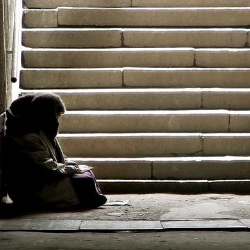Linking together health provision, homeless services, and a strategy to provide more housing, is critical to tackling homelessness. These are the key findings from the innovative task group of homelessness agencies across Northern Ireland, set up to tackle the challenges of COVID-19.
Here, Nicola McCrudden, Homeless Sector COVID-19 Liaison Manager, who coordinated the group, reflects on how the crisis was handled and what is next for the sector.
As a long-time believer in meaningful engagement with the frontline, I had the pleasure of working with a group of talented and passionate operational heads (incidentally all are female!). Together, we produced a short report capturing the Northern Ireland homeless sector’s experiences and responses.
In short, the sector was challenged. Homeless service providers were facing increased demand, reduced bed capacity, staffing pressures and additional costs. However, they coped admirably. They simply got on with it, and as a result there were no outbreaks of COVID-19 in hostel accommodation. This can be attributed to good management practices, collaborative working arrangements and a “can do” attitude. Critically, a sector-led, multi-agency group was key to co-ordinating the response and extra funding secured through the Department for Communities was vital in ensuring services remained open and no one slept rough.
1. Restrictions
Adapting services to comply with social distancing rules presented major challenges for some, reducing both occupancy and income. This prompted a reconsideration of permanent physical changes to the layout of buildings, with the intention of increasing single-bed units.
Lockdown affected not just the provision of accommodation, but also support services. Several organisations are now providing floating support remotely, which is working well. Some are providing laptops, phones, and other devices to clients. Others, such as drop-in facilities, reconfigured services to provide more outreach support, including providing hot meals to those without cooking facilities.
2. Staffing
COVID-19 created a range of additional pressures for staff in the homeless sector. Immediately following lockdown, providers had to adapt to reduced staffing levels due to those shielding or in self-quarantine. Staffing structures also changed to stop unnecessary cross-over between individuals to prevent spreading the virus. Staffing costs also increased as many used existing bank and agency staff. While those using Housing Executive funded Crisis Cover initiative[1] highly valued the scheme.
Critically, staff interacting with clients placed themselves at greater risk. While some in the sector initially experienced challenges in sourcing and distributing sufficient PPE, this was later addressed by centralising administration through the Housing Executive.
3. Wellbeing & pay
Both in the short and long-term, there are genuine concerns about staff mental health and wellbeing. Staff are working extremely hard and may see negative effects on their health and wellbeing once they have more breathing space.
Providers are also concerned about how to reward, motivate, and retain staff (many are on low pay) both now and during a potential second wave. Expecting staff to stay in the sector on the same low pay, while facing such personal risk, they feel, is not very realistic.
4. Clients
The biggest change was the drive to accommodate all rough sleepers through the ‘Everybody In’ scheme. The Housing Executive and several providers responded swiftly, going to show what can be achieved. The challenge now is to ensure individuals are placed in the right type of accommodation with the right support and don’t return to the street.
While non-standard accommodation (hotels/B&Bs etc) were needed, due to reduced hostel capacity, prior the pandemic, the group felt there was an over reliance on the use of emergency beds, and that this must change. New solutions – like Housing First – are needed with a focus on close working and jointly funded services with health.
As restrictions are lifted, providers are seeing more of their clients returning to the streets; vulnerable to catching or spreading the virus. There are calls for testing to be introduced for all referrals and assurances that contact tracing will work for a mobile homeless population.
5. Housing
An increase in certain groups becoming homeless, due to the virus, was reported by providers. Lockdown put a strain on family relationships, particularly on younger people with addiction issues. More broadly, there are concerns that homelessness and demand for temporary accommodation will increase when furlough ends, and unemployment inevitably rises.
Given reduced hostel capacity, accommodation for people threatened with homelessness must increase substantially to meet demand. This will require more units of alternative accommodation.
Homelessness is linked to housing supply. The sector wants a housing strategy that specifically refers to preventing and reducing homelessness. Additional supply is needed to enable move on from temporary accommodation, as well as rapid housing solutions, such as Housing First. Support is critical for certain groups with complex needs. As such, a true multi-disciplinary approach will be required to create sustainable housing solutions.
Key asks
The homeless sector identified the following key asks. Namely, to acknowledge that:
|
I feel incredibly privileged to have worked alongside the homeless sector during the crisis, supported by Campbell Tickell’s Annie Field. I respect and admire the sector’s leadership and staff, particularly those who kept people safe and supported, at such personal risk.
I was also impressed by responses from the Housing Executive, other statutory partners, and collaborative working overall. Communication between statutory services and voluntary sector providers was greatly enhanced and had a positive and hopefully lasting effect.
Of course, there were issues, but there was a willingness to come together. People listened more actively, resources were secured, and positive change happened.
While there is a long way to go, and the sector will continue to face challenges, I sense a renewed energy and shared agreement that we are not returning to “business as usual”.
Change has emerged from this crisis, and I am confident that the new ways of working will be better!
[1] The Crisis Cover Initiative exists to ensure organisations providing vital services to at-risk communities can keep their doors open during the Covid-19 pandemic by providing staff relief cover. The NI element of this work has been funded by the Housing Executive.
To discuss any issue raised in this article, contact Nicola McCrudden on: nicola.mccrudden@campbelltickell.com
| Campbell Tickell is an established multi-disciplinary management and recruitment consultancy, operating across the UK and Ireland, focusing on the housing, social care, local government, sport, leisure, charity and voluntary sectors.
We are a values-based business and firmly place the positioning of our support and challenge on helping organisations to attain change that is well thought through, planned and sustainable. At CT, we want to help organisations create the landscape within which we ourselves would like to exist: fair, inclusive, diverse, engaged and transparent. We build from our values in how we approach all our work as a practice. Find out more about CT’s services. |



